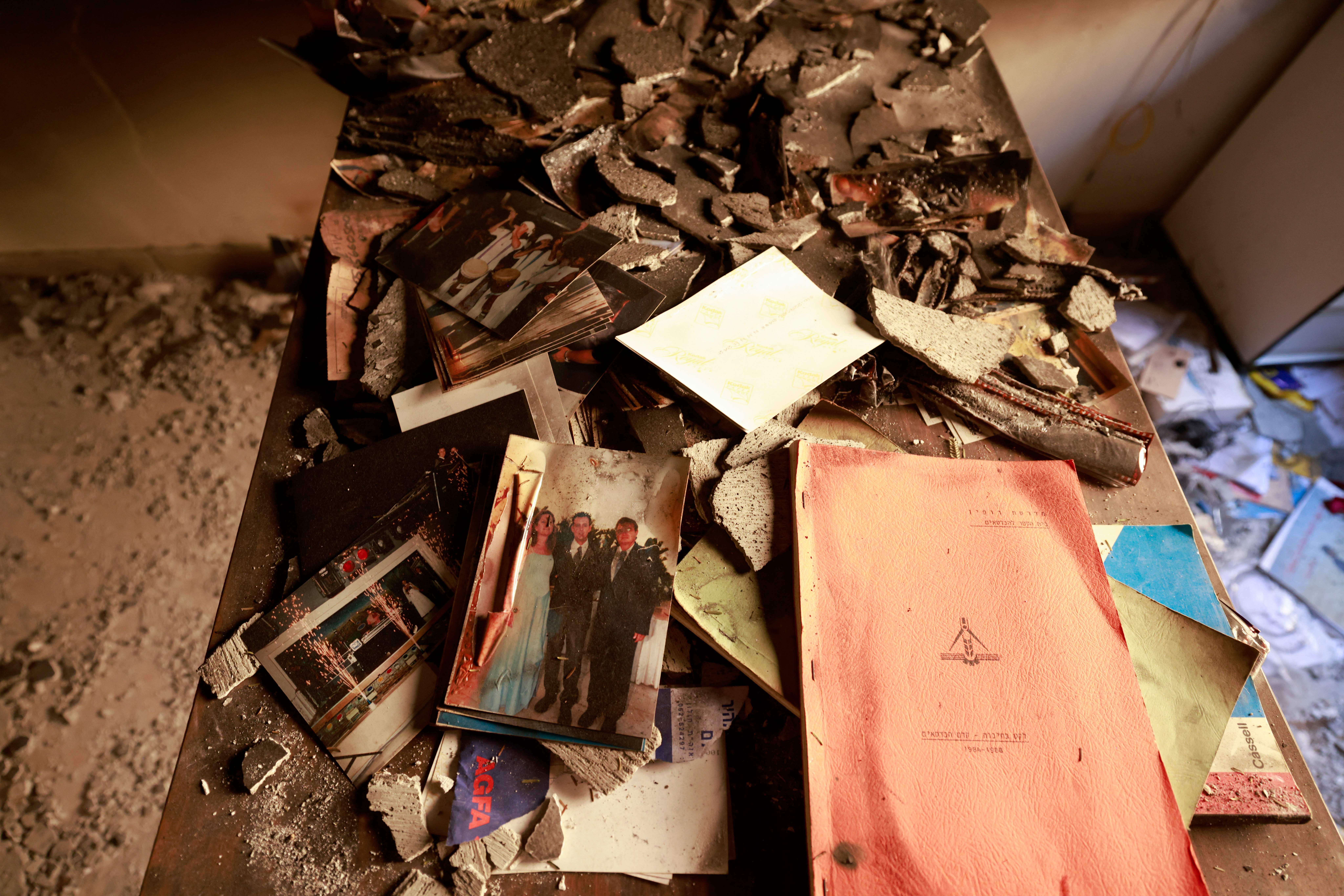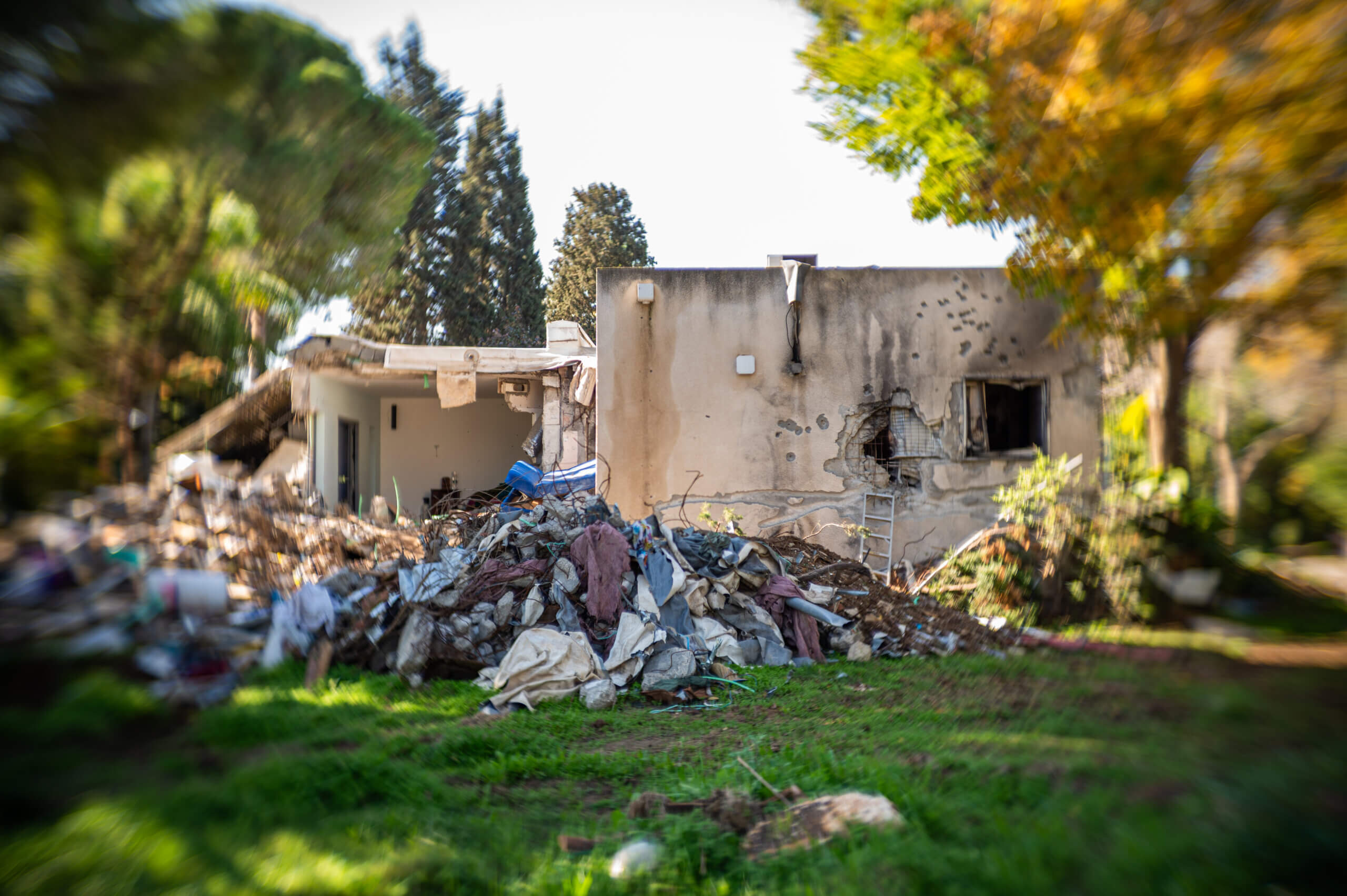Human Rights Watch, harsh critic of Israel, details Oct. 7 atrocities
The group’s pedigree as a staunch defender of Palestinian human rights may make its findings hard for those on the left to ignore

A picture taken during a media tour organized by the Israeli military shows photographs and personal objects inside a house in Kibbutz Nir Oz along the border with the Gaza Strip. Photo by Getty Images
Human Rights Watch issued a report Wednesday detailing war crimes and other violence committed by Palestinian armed groups against Israeli civilians during the Oct. 7 Hamas terrorist attack in southern Israel.
The 252-page document, titled “I Can’t Erase All the Blood from My Mind,” reached several notable conclusions, including that Palestinian civilians were not responsible for major atrocities during the attack.
Yet the report — a chronicle of a horrific terrorist attack — is perhaps most notable because Human Rights Watch is a staunch critic of Israel and three years ago became the first major internal rights group to accuse Israel of apartheid. This pedigree may make its findings hard to ignore for critics of Israel’s war in Gaza, the most strident of whom have dismissed many accounts of atrocities committed on Oct. 7 as Israeli propaganda.
“There’s been a lot of misinformation about what happened on Oct. 7,” said Bill Van Esveld, the organization’s interim Israel and Palestine director.
‘Credible and important’ evidence of sexual violence
But Human Rights Watch’s findings about sexual violence, which has become the most contentious topic related to the atrocities committed on Oct. 7, will likely fall short of what many of Israel’s supporters would have liked to see.
Heather Barr, associate director of Human Rights Watch’s women’s division, said that the organization had reached out to rape crisis centers and other service providers and gathered direct evidence of sexual violence by Palestinian fighters, including forced nudity and posting sexualized images of victims on social media.
But the group’s researchers were themselves ultimately unable to identify any rape survivors or witnesses. They instead included findings from the United Nation’s special representative on sexual violence in conflict, which concluded in March that there were “reasonable grounds” to believe that attackers had engaged in rape and gang rape in at least three locations.
“Those findings are credible and important,” Barr said.
Human Rights Watch’s research, the group said, was partly impeded by the Israeli government, which expelled its country director Omar Shakir in 2019.
Belkis Willie, an associate director for the group who helped produce the report, said that she and a colleague were allowed entry into Israel immediately following the attack and spent a month conducting research. But their repeated requests to visit kibbutzim and other communities attacked on Oct. 7, which were open for media tours, were all denied and government officials declined to share other evidence of the attacks.
Comprehensive portrait of horrific attack
Despite those limitations, the report paints a comprehensive picture of a ghastly attack, in which fighters from several armed Palestinian groups targeted 24 small communities, including kibbutzim, the cities of Sderot and Ofakim, two music festivals and a beach party. The report concluded that militants killed a total of 815 civilians, including 282 women and 36 children, and took 251 civilians hostage.
The report did not examine attacks on Israeli military posts or against Israeli soldiers. The most comprehensive public count found that 373 security forces were killed on Oct. 7 alongside the 815 civilians, 695 of whom were Israeli.

It includes wrenching testimony from survivors, including Ava Meydan, a therapist from Kibbutz Beeri, who hid in bushes next to a road for hours with a Bedouin worker from the kibbutz whose father was ultimately able to rescue them. Meydan said she heard gunmen attack a roadside shelter where survivors from the Nova music festival were sheltering.
“All this time I keep hearing screaming,” Meydan said when she spoke to investigators two weeks after the attack. “Even when I shower, I hear the screams.”
Human Rights Watch identified ten categories of war crimes committed by the fighters, including the deliberate killing of civilians, torture, including the attempted decapitation of a Thai worker, and the mutilation of dead bodies.
Civilian role examined
It also sought to identify the Palestinian groups responsible for the abuses and concluded that five organizations were responsible. In addition to Hamas, they cited evidence that fighters from the armed wings of Fatah, the Popular Front for the Liberation of Palestine, the Democratic Front for the Liberation of Palestine and Palestinian Islamic Jihad had all participated and that the organizations had used a “joint operations room” in Gaza to plan the attack.
Hamas, whose Al-Qassam Brigades led the attack, blamed violence against civilians on unaffiliated Gaza residents.
“People rushed out, along with Palestinian groups that were not participating in the military operation, resulting in chaos in the field and, thus, changing the plan to conduct an operation against military targets,” Hamas officials wrote in a response to Human Rights Watch.
Some Israelis have also blamed Palestinian civilians for some of the most severe atrocities, a charged claim amid Israel’s ongoing war in Gaza, which has killed an estimated 40,000 Palestinians, including many civilians, according to the Gaza Health Ministry.
But Willie, the researcher, said that she found evidence of significant coordination between Palestinian fighters dressed in civilian clothes, like jeans and flip flops, and uniformed fighters, including the use of two-way radios and taking orders from those in uniform.
“We can’t conclude whether those individuals are civilians or not, but what we can conclude is that it was the armed groups that bear responsibility for the worst abuses,” Willie said.
Human Rights Watch provided a long list of recommendations, including a call for Hamas to release all civilian hostages and to cease the rocket attacks; for Israel to respect the rights of Palestinians detained for participating in the attacks and for the United Nations to demand access to Israel and Gaza for international human rights groups to conduct additional investigations.















